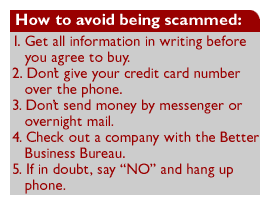|
Senior travel scams
|
 |
May 15, 2000: 10:06 a.m. ET
For older Americans, five ways that they can avoid being taken for a ride
By Staff Writer Jennifer Karchmer
|
NEW YORK (CNNfn) - "Congratulations! You've been specially selected to win a week-long luxury vacation to the Bahamas." Or so the pitch goes.
But before you give up your credit card number and dial up for reservations, beware! You've just been targeted for a travel scam. And older Americans are a highly targeted group, since they typically have more disposable income and travel a lot.
"(Seniors) have the assets -- and when you're trying to sell something, criminals target people who have the money," said Bridget Small, head of the telemarketing fraud team for the American Association of Retired Persons (AARP). "Older people don't see the dangers. They don't understand that people calling might be a criminal. They don't have their radar up."
Whether it's a travel certificate in the mail, a pressing phone call during dinner telling you you've won a trip, or a snazzy e-mail advertising a "free" cruise, it's a scam, experts say.
You've got mail
One of the most common travel scams against the 50-year-old-plus crowd is receiving a travel certificate in the mail notifying you by name that you've won a luxury vacation to an exotic locale.

"You get something in the mail, a fabulous looking document like a diploma, that contains subtle language," Small said. "It's a common ploy."
However, when you add up the fees and the extras, you wind up paying more for the "bargain" than your kids' college tuition. Air fare, in fact, may be free, but your anticipated $50 hotel room is more like $350.
Experts say these "you've won a trip" solicitations are deceptively worded and usually precede come-ons for lengthy spiels on time-share investments -- something else experts suggest you steer clear of.
Five ways seniors can avoiding falling prey to vacation or travel scams:
1. Be wary of "great deals" and low-priced offers.
2. Be suspicious of companies that require you to wait at least 60 days before taking your trip.
3. Get all information in writing before you agree to buy.
4. Don't give your credit card number or bank information over the phone unless you have confidence in the company you are dealing with.
5. When in doubt, say "NO."
Internet scams
As more and more seniors get computer savvy opening e-mail accounts, surfing the Internet, and paying bills online, travel fraud has extended into cyberspace, AARP reports.
Under this scenario, seniors receive a curious e-mail referring them to a Web site where they are asked to fill out a form for a chance to win a vacation to a popular destination like Florida, the Caribbean or Mexico.
Then, they receive an e-mail congratulating them that they've won a trip. To claim the "prize," "winners" are told to call a phone number and give their credit card information.
"E-mail is cheap," pointed out Collot Guerard, an attorney with the Federal Trade Commission in Washington, D.C., making it easier for criminals to thrive via the Internet.
 Other travel scams against seniors include: Other travel scams against seniors include:
Bait and Switch.
You and your spouse make your reservations to Orlando, fly there and show up at what you believe to be your luxury hotel. Instead, you're faced with much inferior accommodations.
Down-payment downer.
A couple receives a super travel bargain and makes a deposit with their credit card. The company strings them along, citing a variety of problems in selecting dates until the deal expires or the promoter's phone number is disconnected altogether. Trying to get a refund is next to impossible.
Red flags you're being scammed
1. Salespersons who use high-pressured tactics, like demanding your credit card number before explaining all the conditions of an offer.
2. Postcard or fax promotional mailings that require you to pay a fee or to purchase membership in a travel club, in order to claim a vacation or travel prize.
3. Low rates on air travel requiring you to purchase an additional ticket for a companion.
4. Offers by companies attempting to subvert U.S. postal authorities by requiring a messenger or courier to deliver the travel package to you in exchange for your payment.
Source: Better Business Bureau.
What to do
So what can seniors do to ward off telemarketers and others trying to lure them on supposedly exotic vacations?
Industry experts suggest you get off the phone as quickly as possible if you're targeted by a telemarketer. The longer you remain on the phone with the caller, the more likely they'll try to sway you with their sales pitch, Small noted.
Tell the caller to put your name on the company's "Do not call" list. If they're persistent, hanging up the phone may do the trick too.
If you think you've been scammed, you can file a report with the Federal Trade Commission by calling 1- 877-FTC-HELP (1-877-382-4357).
And as pushy as telemarketers can be, you should try to resist their sales pitches. AARP recommends you buy travel services only from businesses you know.
Click here for the FTC's consumer complaint form
Before you pay for any travel package, get all the details in writing, including the total cost and refund policy.
Criminals target "people who really want to treat their families and go to a warm weather climate or finally get the chance to take their grandkids to Disney," AARP's Small said. 
-- Click here to send e-mail about this story to Staff Writer Jennifer Karchmer.
|
|
|
|
|
 |

|

